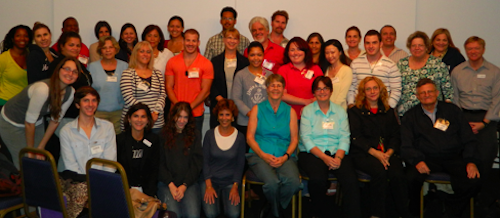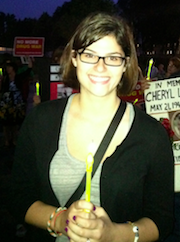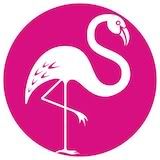Last weekend many members of our Miami community came together for YES Institute’s signature course, Communication Solutions™. Every person in attendance shared a commitment to keeping youth safe.
“I had no idea that this course would change the way that I think and feel about the way I communicate. I’m looking forward to putting in action the “new” model of communication rather than the old yes/no, right/wrong way.”
Miriam Torres, Teacher in Miami-Dade County
“With every word, Martha showed me a new way to look at myself and others. So many moments were “ah-ha” moments. We are all the same no matter what package we came wrapped up in. This course reaffirmed we are all one.”
- Josie Alvarez, Miami-Dade County Public School employee
Friday, June 29, 2012
Thursday, June 21, 2012
Inheritance Of Fear, But Is It Really Mine?
By Erin Pelletier, YES Institute Intern
I just finished my second year at UM and decided to move off-campus for the summer while I intern at YES Institute and work my restaurant job. When I found out I would have my own house, I was excited by the level of freedom, fun, and privacy this would bring to my life. Now, however, I notice how the responsibility of living on my own extends far beyond household chores. Because I am a woman, living on my own seems to necessitate constant vigilance and anxiety. I’ve always noticed that my gender seems to limit the activities, times of day, and areas of town available to me, but living alone has presented a new level of restriction.
People around me seem to be very concerned for my safety when I take the bus to YES Institute and walk home from work. “You should really get pepper spray,” says my dad. “Where’s your boyfriend? Maybe one of the guys can walk you home,” says my boss at the restaurant. I think about the “safety” lessons I’ve learned--to look behind me every block, have my key out in case I need to use it as a weapon, never smile at strange men, cross the street when a man approaches--and the pressure and responsibility become overwhelming. In some ways, I’m sure this endless fear and suspicion has probably protected me, but in other ways it has mainly served to make me feel weak and dependent on men for “protection.”
I thought about this during Gender Continuum at YES Institute. The rigid rules regarding femininity and masculinity we are taught from birth have profound, lifelong consequences. Each person is unique and has different experiences of gender, and so how can we all be expected to fit into two opposite and polarizing categories? Until we can think about gender beyond fixed and unforgiving notions of masculinity and femininity and live accordingly, these categories will continue to haunt us, and set men against women in a way that arouses fear, distrust, and resentment.
During my time at YES Institute, both as an intern and as a participant in courses, I have acquired the tools and knowledge to expand my own ideas about gender. I no longer think of gender as an oppressive binary structure in which my own sex always loses, but rather as a complex social concept which occurs differently for everyone. I have learned ways to create a world in which we do not allow gender to govern us.
I just finished my second year at UM and decided to move off-campus for the summer while I intern at YES Institute and work my restaurant job. When I found out I would have my own house, I was excited by the level of freedom, fun, and privacy this would bring to my life. Now, however, I notice how the responsibility of living on my own extends far beyond household chores. Because I am a woman, living on my own seems to necessitate constant vigilance and anxiety. I’ve always noticed that my gender seems to limit the activities, times of day, and areas of town available to me, but living alone has presented a new level of restriction.
People around me seem to be very concerned for my safety when I take the bus to YES Institute and walk home from work. “You should really get pepper spray,” says my dad. “Where’s your boyfriend? Maybe one of the guys can walk you home,” says my boss at the restaurant. I think about the “safety” lessons I’ve learned--to look behind me every block, have my key out in case I need to use it as a weapon, never smile at strange men, cross the street when a man approaches--and the pressure and responsibility become overwhelming. In some ways, I’m sure this endless fear and suspicion has probably protected me, but in other ways it has mainly served to make me feel weak and dependent on men for “protection.”
I thought about this during Gender Continuum at YES Institute. The rigid rules regarding femininity and masculinity we are taught from birth have profound, lifelong consequences. Each person is unique and has different experiences of gender, and so how can we all be expected to fit into two opposite and polarizing categories? Until we can think about gender beyond fixed and unforgiving notions of masculinity and femininity and live accordingly, these categories will continue to haunt us, and set men against women in a way that arouses fear, distrust, and resentment.
During my time at YES Institute, both as an intern and as a participant in courses, I have acquired the tools and knowledge to expand my own ideas about gender. I no longer think of gender as an oppressive binary structure in which my own sex always loses, but rather as a complex social concept which occurs differently for everyone. I have learned ways to create a world in which we do not allow gender to govern us.
Thursday, June 14, 2012
Barry Nursing Students Caring for All
by Caro Hernandez, Project Facilitator
The medical community continues to request YES Institute’s Community Dialogues to educate healthcare students on topics of gender and orientation. Dr. Janis Donahue was first introduced to YES Institute through a Community Dialogue at Children's Diagnostic & Treatment Center (CDTC) last year. Seeing the impact the dialogue created at CDTC, Dr. Donahue invited us to speak with her nurse practitioner students at Barry University.
The students reported they never get the opportunity to talk openly about these topics, particularly at their workplace. One nurse shared she had been treating a patient for a few days before she heard her supervisor whisper "your patient is a he-she.” Uncertainty about gender and fear of saying the wrong thing prevented open dialogue about her patient's needs.
Some of the nurses remarked that there is not enough education on bodies and gender in the medical community. “I teach a class on sexual development, and our textbook has only one small paragraph on intersex bodies,” remarked a practitioner student.
Another added, “I see now how complicated life can be if someone challenges society’s norms when it comes to bodies and gender. I never had to think about it before today.”
A special thanks to YES Institute volunteers Virgin Vandervlugt, RN, and Krysta for sharing their heartfelt personal and professional experiences for the class.
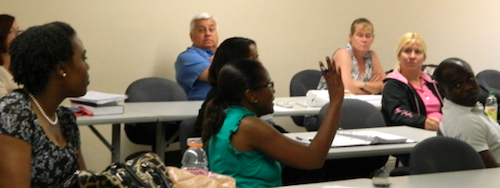 |
| Barry University Nurse Practitioner students. |
The medical community continues to request YES Institute’s Community Dialogues to educate healthcare students on topics of gender and orientation. Dr. Janis Donahue was first introduced to YES Institute through a Community Dialogue at Children's Diagnostic & Treatment Center (CDTC) last year. Seeing the impact the dialogue created at CDTC, Dr. Donahue invited us to speak with her nurse practitioner students at Barry University.
The students reported they never get the opportunity to talk openly about these topics, particularly at their workplace. One nurse shared she had been treating a patient for a few days before she heard her supervisor whisper "your patient is a he-she.” Uncertainty about gender and fear of saying the wrong thing prevented open dialogue about her patient's needs.
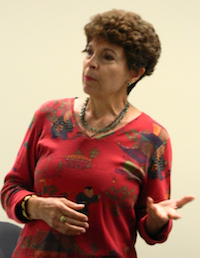 |
| Virgin Vandervlugt, RN. |
Another added, “I see now how complicated life can be if someone challenges society’s norms when it comes to bodies and gender. I never had to think about it before today.”
A special thanks to YES Institute volunteers Virgin Vandervlugt, RN, and Krysta for sharing their heartfelt personal and professional experiences for the class.
Friday, June 8, 2012
Goodwill, Great Heart
By Caro Hernandez, Project Facilitator
This past week, Goodwill Industries of South Florida invited YES Institute to engage in community dialogue about how gender and orientation topics show up in their workplace environment. Over 50 staff members including managers, nurses, job placement professionals and client service personnel from the Miami-Dade and Broward County locations were in attendance.
Once the conversation began, we heard how profoundly these topics impacted the personal and professional lives of many of the people in the room. One employee shared that among her family of eight brothers and sisters, her parents and siblings rejected one of her brothers because he identifies as gay. Speaking through her tears, she relayed how she is the only family member that speaks to him and how heavy this conflict weighs on her heart.
A job placement specialist inquired about resources for their clients who might identify as transgender. They said, “I was so embarrassed to ask one client, ‘Are you a he or she?’ We don’t have a lot of education on transgender,” even though several employees are noticing a rise in the number of clients with this experience. Others noted that while Goodwill strives to be understanding and welcome, the workplaces they refer their job placement clients to have little understanding of gender transitioning.
“I’ve learned that I need a group like this. Being a veteran, my beliefs have evolved and I hope for the better. Meeting people who are gay and transgender has changed my life.” –Goodwill participant
The dialogue was a powerful new beginning in empowering the Miami Goodwill community towards an even more inclusive and welcoming workplace. We look forward to continued conversations and collaborative efforts.
“I have been a very open person in all respects, but now I know that not everybody is as open as I am. I learned today that I shouldn't disregard people that do not have my same point of view.” –Goodwill participant
This past week, Goodwill Industries of South Florida invited YES Institute to engage in community dialogue about how gender and orientation topics show up in their workplace environment. Over 50 staff members including managers, nurses, job placement professionals and client service personnel from the Miami-Dade and Broward County locations were in attendance.
 |
| Miami Goodwill staff packed the room |
Once the conversation began, we heard how profoundly these topics impacted the personal and professional lives of many of the people in the room. One employee shared that among her family of eight brothers and sisters, her parents and siblings rejected one of her brothers because he identifies as gay. Speaking through her tears, she relayed how she is the only family member that speaks to him and how heavy this conflict weighs on her heart.
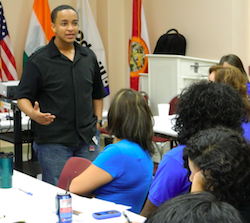 | ||
| Staff had many questions for Sky about employment |
“I’ve learned that I need a group like this. Being a veteran, my beliefs have evolved and I hope for the better. Meeting people who are gay and transgender has changed my life.” –Goodwill participant
The dialogue was a powerful new beginning in empowering the Miami Goodwill community towards an even more inclusive and welcoming workplace. We look forward to continued conversations and collaborative efforts.
“I have been a very open person in all respects, but now I know that not everybody is as open as I am. I learned today that I shouldn't disregard people that do not have my same point of view.” –Goodwill participant
Tuesday, June 5, 2012
Pink Flamingo Continues Education
By Caro Hernandez, Project Facilitator, YES Institute
Hotel managers, concierges, and staff came together last week for another YES Institute Community Dialogue at the Miami-Dade Gay & Lesbian Chamber of Commerce (MDGLCC) for the Pink Flamingo Certification Program.
Steve Adkins, the President and CEO of MDGLCC, and Rachel Sottile the Executive Director of YES Institute, created a unique approach for the pioneering Pink Flamingo Certification Program - a program designed for the hospitality and tourism industry committed to creating a welcoming environment for Miami Beach visitors, residents, employees, and families.
Businesses and hotels that become Pink Flamingo certified have their entire staff participate in an educational dialogue on gender and orientation by YES Institute. Participants, many for the first time, have an opportunity to converse with speakers who identify as gay and/or transgender and learn about their travel-related experiences.
The dialogue also covers practical situations that can arise for tourism personnel. A key component of the presentation explores how language can either foster relatedness or create disconnection. Instead of saying, “Is your husband/wife joining you at the lounge today?” concierges learn the benefits of asking, “Is someone special joining you at the lounge today?” Also, participants explore situations when someone's name on their drivers license doesn't match the name on the hotel booking. This conversation supports a more friendly and less awkward experience for transgender patrons.
One participant said, “I love that there’s movement toward education on gender and orientation in the hospitality world - it’s a huge need.” Another participant said, “The training was very informative. It will help me communicate better with my staff and create an environment where all of my guests feel comfortable.”
For more information about the Pink Flamingo program, please contact Cindy at 305-397-8914 or email cindy@gogaymiami.com
Hotel managers, concierges, and staff came together last week for another YES Institute Community Dialogue at the Miami-Dade Gay & Lesbian Chamber of Commerce (MDGLCC) for the Pink Flamingo Certification Program.
Steve Adkins, the President and CEO of MDGLCC, and Rachel Sottile the Executive Director of YES Institute, created a unique approach for the pioneering Pink Flamingo Certification Program - a program designed for the hospitality and tourism industry committed to creating a welcoming environment for Miami Beach visitors, residents, employees, and families.
The dialogue also covers practical situations that can arise for tourism personnel. A key component of the presentation explores how language can either foster relatedness or create disconnection. Instead of saying, “Is your husband/wife joining you at the lounge today?” concierges learn the benefits of asking, “Is someone special joining you at the lounge today?” Also, participants explore situations when someone's name on their drivers license doesn't match the name on the hotel booking. This conversation supports a more friendly and less awkward experience for transgender patrons.
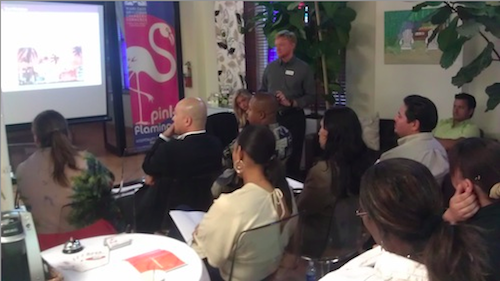 |
| Many hotels across Miami-Dade are participating in the program. |
One participant said, “I love that there’s movement toward education on gender and orientation in the hospitality world - it’s a huge need.” Another participant said, “The training was very informative. It will help me communicate better with my staff and create an environment where all of my guests feel comfortable.”
For more information about the Pink Flamingo program, please contact Cindy at 305-397-8914 or email cindy@gogaymiami.com
Subscribe to:
Posts (Atom)

